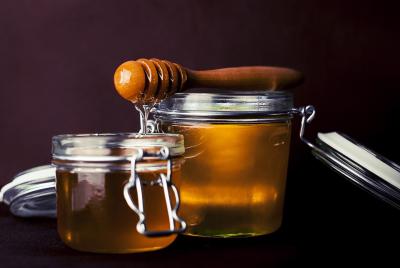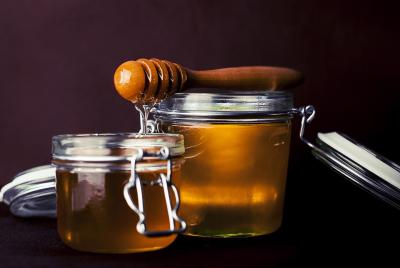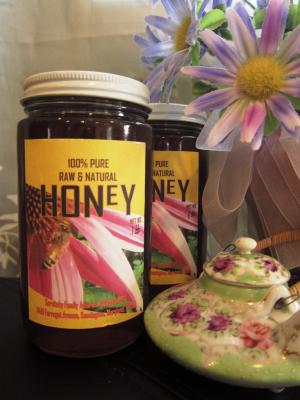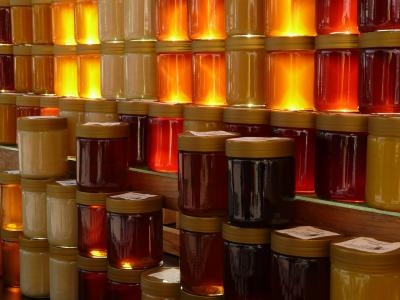Lets start with the basics: honey is produced when bees swallow nectar from flowers, and then later regurgitate it, passing it from bee to bee in this matter, lowering its moisture content and altering its properties to create a sweet substance that is fit for long-term storage. The flower-bee relationship is mutual, as the bee spreads the pollen of flowers, and consequently means that pollen typically ends up in honey.
Raw honey refers to this natural substance in its purest, unheated form, pollen and wax residue — and sometimes parts of bees — included. It’s typically filtered slightly, to remove larger particles, but not enough for the pollen particles to be removed, thus maintaining the nutritional benefit of pollen.
Raw honey refers to this natural substance in its purest, unheated form, pollen and wax residue — and sometimes parts of bees — included. It’s typically filtered slightly, to remove larger particles, but not enough for the pollen particles to be removed, thus maintaining the nutritional benefit of pollen.
This raw honey from Maryland was produced at the hives co-located at a local farm - One Acre Farm in Boyds, MD. Knowing exactly where it came from is just one advantage of the local raw honey.
Most honey found in stores is not raw honey, but rather commercial honey. When honey is not considered raw, it usually means the honey has gone through heavy filtration or has been pasteurized, which involves heating the honey to a temperature of about 170 degrees Fahrenheit. Heavy filtration often times can remove all pollen particles, while pasteurization can destroy natural yeast and enzymes found in honey.
Raw honey maintains the pollen and natural yeast and enzymes that occur in honey, thereby maintaining all of honey’s natural health benefits. All of the following are health benefits of consuming raw honey:
• Allergy relief can be achieved by consuming local honey due to the pollen present.
• Antimicrobial activity – honey has been found to reduce redness, swelling, and healing time of bacteria-infected wounds.
• Antioxidants are plentiful honey, which often contains as much as most fruits and vegetables.
• Phytonutrients in honey provide anti-inflammatory and antioxidant benefits.
• Provide sore throat relief as honey contains a substance commonly used in cough medicines.
• Beneficial vitamins, minerals and enzymes can be obtained through the consumption of honey.
• Anti-viral and anti-fungal properties are found in honey.
While it is possible to purchase raw honey at the grocery store, most store-bought honey is commercial honey, and has undergone pasteurization and heavy filtration. Not only that, the world “raw” as it relates to honey is not currently defined or regulated by the USDA, which means even honey labeled as “raw honey”, might not be the lightly-filtered and unpasteurized product that you are looking for.
Which means the best way to ensure the honey you’re buying is indeed raw—and therefore contains all of those desirable health benefits—is to find a local producer that you can personally talk to regarding their production process. Or better yet, visit a local producer and see the beehives and honey-making process for yourself!
Raw honey maintains the pollen and natural yeast and enzymes that occur in honey, thereby maintaining all of honey’s natural health benefits. All of the following are health benefits of consuming raw honey:
• Allergy relief can be achieved by consuming local honey due to the pollen present.
• Antimicrobial activity – honey has been found to reduce redness, swelling, and healing time of bacteria-infected wounds.
• Antioxidants are plentiful honey, which often contains as much as most fruits and vegetables.
• Phytonutrients in honey provide anti-inflammatory and antioxidant benefits.
• Provide sore throat relief as honey contains a substance commonly used in cough medicines.
• Beneficial vitamins, minerals and enzymes can be obtained through the consumption of honey.
• Anti-viral and anti-fungal properties are found in honey.
While it is possible to purchase raw honey at the grocery store, most store-bought honey is commercial honey, and has undergone pasteurization and heavy filtration. Not only that, the world “raw” as it relates to honey is not currently defined or regulated by the USDA, which means even honey labeled as “raw honey”, might not be the lightly-filtered and unpasteurized product that you are looking for.
Which means the best way to ensure the honey you’re buying is indeed raw—and therefore contains all of those desirable health benefits—is to find a local producer that you can personally talk to regarding their production process. Or better yet, visit a local producer and see the beehives and honey-making process for yourself!








